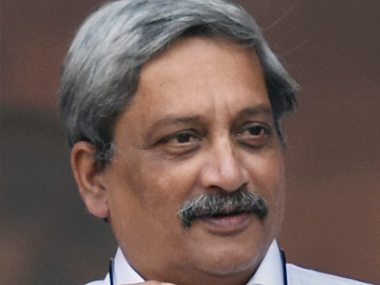The irrepressible Manohar Gopalakrishna Prabhu Parrikar wore his heart on his sleeve and interactions with him were never dull. As India’s defence minister (2014-2017), he wielded the trappings of power and paraphernalia in a manner that was as casual and carefree as his unruly, almost carelessly combed mop of hair. Even as he moved along in the hallowed corridors of South Block that houses the defence ministry, his heart, mind and soul were always in Goa. “I do not have many friends in Delhi. After office, I spend time alone. But it is in Goa where I really want to be, I am always with friends,” he once told this journalist. And so, when in 2017, a choice had to be made between the chief ministership of Goa and to continue as the country’s defence minister, he did not have to think twice. Diagnosed with pancreatic cancer that was treated in some of the best medical centres in India and abroad, Parrikar passed away on Sunday at an unripe 63 in his beloved Goa, where he longed to be. So on second thoughts, it may have been a sense of premonition of the inevitable. He had once remarked, “Goans know how to hold their drinks. Just by the way someone is behaving after a couple of stiff ones, we can make out who is a tourist and who is not.” [caption id=“attachment_6277951” align=“alignleft” width=“380”]  File image of Manohar Parrikar, who passed away on Sunday. PTI[/caption] Often, Parrikar took one aback with his statements. While he was a hardcore member of the RSS, an organisation he joined when he was in school, he once expressed his discomfort while speaking in Hindi. He had said, “My Hindi is quite poor; I am more at home in English, if you please.” In a way, that was perhaps his unique way of underscoring the criticality of regional, sub-national identity in the face of an overwhelming national identity and perhaps identifying the fact that the two, rather than being contradictory, may possibly complement each other. And on another occasion, Parrikar quipped in his deadpan style, “I feel quite intrigued by our society. I went for the induction of the Aakash (missile) in the Air Force. It was inducted by conducting a puja…breaking a coconut on the missile… We have these two minds. One side is a scientific mind and the other one is a 2,000-year-old mind. Of course, our ancestors were among the best thinkers in science. But why do I have to follow what they did 2,000 years back?” A man who meticulously managed his daily work plan, Parrikar would often mention his RSS background and talk about how it had brought about “discipline” in his life. Born in 1955 in Goa’s Mapusa, Parrikar went on to graduate from IIT-Bombay in 1978. His specialisation in metallurgical engineering came in handy during his stint as defence minister. “In military metallurgy, the Russians rule,” he asserted once on the sidelines of a military industry event. His engineering background also enabled him to settle down quickly in the defence ministry, where it is a very strong plus to be able to fully comprehend the complications of military technology. Parrikar loved to talk of the Strategic Partnership Model, which primarily aimed at harnessing the strengths of the private industry to create capacity and infrastructure for strategic segments over and above that existing in the public sector units like ordnance factories and DRDO. A strong votary of building a robust military-industrial complex with the SP Model, he berated the state-owned defence public sector units that have not quite been up to the task of building and modernising India’s military equipment. “Natural habits die very hard. Habits which have been created for 50 years…you find comfort in the cocoon. You don’t want to dig out,” he once rebuked the PSUs. There was a staunchly bellicose aspect to Parrikar’s character too. It was during his tenure as defence minister when the decision was taken to carry out surgical strikes at terror launch bases inside Pakistan-occupied Kashmir on the intervening night of 28-29 September, 2016. Later, he asserted, “When the Indian Army says something, we should believe it. It is the world’s best.” Parrikar also created a stir with his support for a policy that was at variance with India’s No-First-Use (NFU) policy of nuclear weapons. “People say India has a no-first-use nuclear concept. Why should I bind myself? I should say that I’m a responsible nuclear power and I’ll not use it irresponsibly. This is my (personal) thinking”. Parrikar’s stints as Goa chief minister were also not bereft of controversies. His approval to a proposal to turn more than 50 government primary schools in rural areas to Vidya Bharati, a Sangh affiliate, raised the hackles of many, as did his decision to clear a government-funded trip for six Goa ministers and MLAs to attend the 2014 FIFA World Cup in Brazil. While there may be many more superb anecdotes about Parrikar, the abiding memory of this colourful persona would be his in-your-face attitude. Rest in peace, Mr Parrikar, and in your own upfront way.
Parrikar wielded the trappings of power and paraphernalia in a manner that was as casual and carefree as his unruly, almost carelessly combed mop of hair.
Advertisement
End of Article


)

)
)
)
)
)
)
)
)



